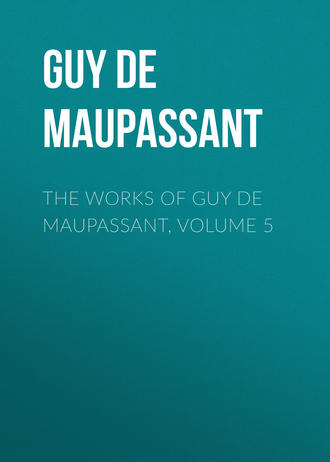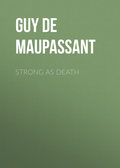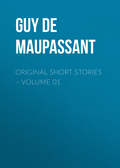
Ги де Мопассан
The works of Guy de Maupassant, Volume 5
"She ought to be undressed and put to bed," said the priest; and, with his aid, Joseph Couillard, old Simon and Ludivine tried to raise the baroness.
As they lifted her, her head fell backwards, and her dress, which they were grasping, gave way under the dead weight of her huge body. They were obliged to lay her down again, and Jeanne shrieked with horror.
At last an armchair was brought from the drawing-room; the baroness was placed in it, carried slowly indoors, then upstairs, and laid on the bed. The cook was undressing her as best she could when the Widow Dentu came in, as if, like the priest, she had "smelt death," as the servants said. Joseph Couillard hurried off for the doctor, and the priest was going to fetch the holy oil, when the nurse whispered in his ear:
"You needn't trouble to go, Monsieur le curé. I have seen too much of death not to know that she is gone."
Jeanne, in desperation, begged them to tell her what she could do, what remedies they had better apply. The curé thought that anyhow he might pronounce an absolution, and for two hours they watched beside the lifeless, livid body, Jeanne, unable to contain her grief, sobbing aloud as she knelt beside the bed. When the door opened to admit the doctor, she thought that with him came safety and consolation and hope, and she rushed to meet him, trying to tell him, in a voice broken with sobs, all the details of the catastrophe.
"She was walking – like she does every day – and she seemed quite well, better even – than usual. She had eaten some soup and two eggs for lunch, and – quite suddenly, without any warning she fell – and turned black, like she is now; she has not moved since, and we have – tried everything to restore her to consciousness – everything – "
She stopped abruptly for she saw the nurse making a sign to the doctor to intimate that it was all over. Then she refused to understand the gesture, and went on anxiously:
"Is it anything serious? Do you think there is any danger?"
He answered at last:
"I very much fear that – that life is extinct. Be brave and try to bear up."
For an answer Jeanne opened her arms, and threw herself on her mother's body. Julien came in. He made no sign of grief or pity, but stood looking simply vexed; he had been taken too much by surprise to at once assume an expression of sorrow.
"I expected it," he whispered. "I knew she could not live long."
He drew out his handkerchief, wiped his eyes, knelt down and crossed himself as he mumbled something, then rose and attempted to raise his wife. She was clinging to the corpse, almost lying on it as she passionately kissed it; they had to drag her away for she was nearly mad with grief, and she was not allowed to go back for an hour.
Then every shadow of hope had vanished, and the room had been arranged fittingly for its dead occupant. The day was drawing to a close, and Julien and the priest were standing near one of the windows, talking in whispers. The Widow Dentu, thoroughly accustomed to death, was already comfortably dozing in an armchair. The curé went to meet Jeanne as she came into the room, and taking both her hands in his, he exhorted her to be brave under this sorrow, and attempted to comfort her with the consolation of religion. Then he spoke of her dead mother's good life, and offered to pass the night in prayers beside the body.
But Jeanne refused this offer as well as she could for her tears. She wanted to be alone, quite alone, with her mother this last night.
"That cannot be," interposed Julien; "we will watch beside her together."
She shook her head, unable to speak for some moments; then she said:
"She was my mother, and I want to watch beside her alone."
"Let her do as she wants," whispered the doctor; "the nurse can stay in the next room," and Julien and the priest, thinking of their night's rest, gave in.
The Abbé Picot knelt down, prayed for a few moments, then rose and went out of the room, saying, "She was a saintly woman," in the same tone as he always said, "Dominus vobiscum."
"Won't you have some dinner?" asked the vicomte in a perfectly ordinary voice.
Jeanne, not thinking he was speaking to her, made no answer.
"You would feel much better if you would eat something," he went on again.
"Let someone go for papa, directly," she said as if she had not heard what he said; and he went out of the room to dispatch a mounted messenger to Rouen.
Jeanne sank into a sort of stupor, as if she were waiting to give way to her passion of regret until she should be alone with her mother. The room became filled with shadows. The Widow Dentu moved noiselessly about, arranging everything for the night, and at last lighted two candles which she placed at the head of the bed on a small table covered with a white cloth. Jeanne seemed unconscious of everything; she was waiting until she should be alone.
When he had dined, Julien came upstairs again and asked for the second time:
"Won't you have something to eat?"
His wife shook her head, and he sat down looking more resigned than sad, and did not say anything more. They all three sat apart from one another; the nurse dropped off to sleep every now and then, snored for a little while, then awoke with a start. After some time Julien rose and went over to his wife.
"Do you still want to be left alone?" he asked.
She eagerly took his hand in hers: "Oh, yes; do leave me," she answered.
He kissed her on the forehead, whispered, "I shall come and see you during the night," then went away with the Widow Dentu, who wheeled her armchair into the next room.
Jeanne closed the door and put both windows wide open. A warm breeze, laden with the sweet smell of the hay, blew into the room, and on the lawn, which had been mown the day before, she could see the heaps of dry grass lying in the moonlight. She turned away from the window and went back to the bed, for the soft, beautiful night seemed to mock her grief.
Her mother was no longer swollen as she had been when she died; she looked simply asleep, only her sleep was more peaceful than it had ever been before; the wind made the candles flicker, and the changing shadows made the dead face look as though it moved and lived again. As Jeanne gazed at it the memories of her early childhood came crowding into her mind. She could see again her mother sitting in the convent parlor, holding out the bag of cakes she had brought for her little girl; she thought of all her little ways, her affectionate words, the way she used to move, the wrinkles that came round her eyes when she laughed, the deep sigh she always heaved when she sat down, and all her little, daily habits, and as she stood gazing at the dead body she kept repeating, almost mechanically: "She is dead; she is dead;" until at last she realized all the horror of that word.
The woman who was lying there – mamma – little mother – Madame Adélaïde, was dead! She would never move, never speak, never laugh, never say, "Good morning, Jeannette"; never sit opposite her husband at the dinner table again. She was dead. She would be enclosed in a coffin, placed beneath the ground, and that would be the end; they would never see her again. It could not be possible! What! She, her daughter, had now no mother! Had she indeed lost for ever this dear face, the first she had ever looked upon, the first she had ever loved, this kindly loving mother, whose place in her heart could never be filled? And in a few hours even this still, unconscious face would have vanished, and then there would be nothing left her but a memory. She fell on her knees in despair, wringing her hands and pressing her lips to the bed.
"Oh, mother, mother! My darling mother!" she cried, in a broken voice which was stifled by the bed-covering.
She felt she was going mad; mad, like the night she had fled into the snow. She rushed to the window to breathe the fresh air which had not passed over the corpse or the bed on which it lay. The new-mown hay, the trees, the waste land and the distant sea lay peacefully sleeping in the moonlight, and the tears welled up into Jeanne's eyes as she looked out into the clear, calm night. She went back to her seat by the bedside and held her mother's dead hand in hers, as if she were lying ill instead of dead. Attracted by the lighted candles, a big, winged insect had entered through the open window and was flying about the room, dashing against the wall at every moment with a faint thud. It disturbed Jeanne, and she looked up to see where it was, but she could only see its shadow moving over the white ceiling.
Its buzzing suddenly ceased, and then, besides the regular ticking of the clock, Jeanne noticed another fainter rustling noise. It was the ticking of her mother's watch, which had been forgotten when her dress had been taken off and thrown at the foot of the bed, and the idea of this little piece of mechanism still moving while her mother lay dead, sent a fresh pang of anguish through her heart. She looked at the time. It was hardly half-past ten, and as she thought of the long night to come, she was seized with a horrible dread.
She began to think of her own life – of Rosalie, of Gilberte – of all her illusions which had been, one by one, so cruelly destroyed. Life contained nothing but misery and pain, misfortune and death; there was nothing true, nothing honest, nothing but what gave rise to suffering and tears. Repose and happiness could only be expected in another existence, when the soul had been delivered from its early trials. Her thoughts turned to the unfathomable mystery of the soul, but, as she reasoned about it, her poetic theories were invariably upset by others, just as poetic and just as unreal. Where was now her mother's soul, the soul which had forsaken this still, cold body? Perhaps it was far away, floating in space. But had it entirely vanished like the perfume from a withered flower, or was it wandering like some invisible bird freed from its cage? Had it returned to God, or was it scattered among the new germs of creation? It might be very near; perhaps in this very room, hovering around the inanimate body it had left, and at this thought Jeanne fancied she felt a breath, as if a spirit had passed by her. Her blood ran cold with terror; she did not dare turn round to look behind her, and she sat motionless, her heart beating wildly.
At that moment the invisible insect again commenced its buzzing, noisy flight, and Jeanne trembled from head to foot at the sound. Then, as she recognized the noise, she felt a little reassured, and rose and looked around. Her eyes fell on the escritoire with the sphinxes' heads, the guardian of the "souvenirs." As she looked at it she thought it would be fulfilling a sacred, filial duty, which would please her mother as she looked down on her from another world, to read these letters, as she might have done a holy book during this last watch.
She knew it was the correspondence of her grandfather and grandmother, whom she had never known; and it seemed as if her hands would join theirs across her mother's corpse, and so a sacred chain of affection would be formed between those who had died so long ago, their daughter who had but just joined them, and her child who was still on earth.
She opened the escritoire and took out the letters; they had been carefully tied into ten little packets, which were laid side by side in the lowest drawer. A refinement of sentimentality prompted her to place them all on the bed in the baroness's arms; then she began to read.
They were old-fashioned letters with the perfume of another century about them, such as are treasured up in every family. The first commenced "My dearie"; another "My little darling"; then came some beginning "My pet" – "My beloved daughter," then "My dear child" – "My dear Adélaïde" – "My dear daughter," the commencements varying as the letters had been addressed to the child, the young girl, and, later on, to the young wife. They were all full of foolish, loving phrases, and news about a thousand insignificant, homely events, which, to a stranger, would have seemed too trivial to mention: "Father has an influenza; Hortense has burnt her finger; Croquerat, the cat, is dead; the fir tree which stood on the right-hand side of the gate has been cut down; mother lost her mass book as she was coming home from church, she thinks someone must have stolen it," and they talked about people whom Jeanne had never known, but whose names were vaguely familiar to her.
She was touched by these simple details which seemed to reveal all her mother's life and inmost thoughts to her. She looked at the corpse as it lay there, and suddenly she began to read the letters aloud, as though to console and gladden the dead heart once more; and a smile of happiness seemed to light up the face. As she finished reading them, Jeanne threw the letters on the foot of the bed, resolving to place them all in her mother's coffin.
She untied another packet. These were in another handwriting, and the first ran thus:
"I cannot live without your kisses. I love you madly."
There was nothing more, not even a signature. Jeanne turned the paper over, unable to understand it. It was addressed clearly enough to "Madame la baronne Le Perthuis des Vauds."
She opened the next:
"Come to-night as soon as he has gone out. We shall have at least one hour together. I adore you."
A third:
"I have passed a night of longing and anguish. I fancied you in my arms, your mouth quivering beneath mine, your eyes looking into my eyes. And then I could have dashed myself from the window, as I thought that, at that very moment, you were sleeping beside him, at the mercy of his caresses."
Jeanne stopped in amazement. What did it all mean? To whom were these words of love addressed? She read on, finding in every letter the same distracted phrases, the same assignations, the same cautions, and, at the end, always the five words: "Above all, burn this letter." At last she came to an ordinary note, merely accepting an invitation to dinner; it was signed "Paul d'Ennemare." Why, that was the man of whom the baron still spoke as "Poor old Paul," and whose wife had been the baroness's dearest friend!
Then into Jeanne's mind came a suspicion which at once changed to a certainty – he had been her mother's lover! With a sudden gesture of loathing, she threw from her all these odious letters, as she would have shaken off some venomous reptile, and, running to the window, she wept bitterly. All her strength seemed to have left her; she sank on the ground, and, hiding her face in the curtains to stifle her moans, she sobbed in an agony of despair. She would have crouched there the whole night if the sound of someone moving in the next room had not made her start to her feet. Perhaps it was her father! And all these letters were lying on the bed and on the floor! He had only to come in and open one, and he would know all!
She seized all the old, yellow papers – her grandparents' epistles, the love letters, those she had not unfolded, those that were still lying in the drawer – and threw them all into the fireplace. Then she took one of the candles which were burning on the little table, and set fire to this heap of paper. A bright flame sprang up at once, lighting up the room, the bed and the corpse with a bright, flickering light, and casting on the white bed-curtain a dark, trembling shadow of the rigid face and huge body.
When there was nothing left but a heap of ashes in the bottom of the grate, Jeanne went and sat by the window, as though now she dare not sit by the corpse. The tears streamed from her eyes, and, hiding her face in her hands, she moaned out in heartbroken tones: "Oh, poor mamma! Poor mamma!"
Then a terrible thought came to her: Suppose her mother, by some strange chance, was not dead; suppose she was only in a trance-like sleep and should suddenly rise and speak! Would not the knowledge of this horrible secret lessen her, Jeanne's, love for her mother? Should she be able to kiss her with the same respect, and regard her with the same esteem as before? No! She knew it would be impossible; and the thought almost broke her heart.
The night wore on; the stars were fading, and a cool breeze sprang up. The moon was slowly sinking towards the sea over which she was shedding her silver light, and the memory of that other night she had passed at the window, the night of her return from the convent, came back to Jeanne. Ah! how far away was that happy time! How changed everything was, and what a different future lay before her from what she had pictured then! Over the sky crept a faint, tender tinge of pink, and the brilliant dawn seemed strange and unnatural to her, as she wondered how such glorious sunrises could illumine a world in which there was no joy or happiness.
A slight sound startled her, and looking round she saw Julien.
"Well, are you not very tired?" he said.
"No," she answered, feeling glad that her lonely vigil had come to an end.
"Now go and rest," said her husband.
She pressed a long sorrowful kiss on her mother's face; then left the room.
That day passed in attending to those melancholy duties that always surround a death; the baron came in the evening, and cried a great deal over his wife. The next day the funeral took place; Jeanne pressed her lips to the clammy forehead for the last time, drew the sheet once more over the still face, saw the coffin fastened down, and then went to await the people who were to attend the funeral.
Gilberte arrived first, and threw herself into Jeanne's arms, sobbing violently. The carriages began to drive up, and voices were heard in the hall. The room gradually filled with women with whom Jeanne was not acquainted; then the Marquise de Coutelier and the Vicomtesse de Briseville arrived, and went up to her and kissed her. She suddenly perceived that Aunt Lison was in the room, and she gave her such an affectionate embrace, that the old maid was nearly overcome. Julien came in dressed in deep mourning; he seemed very busy, and very pleased that all these people had come. He whispered some question to his wife about the arrangements, and added in a low tone:
"It will be a very grand funeral; all the best families are here."
Then he went away again, bowing to the ladies as he passed down the room.
Aunt Lison and the Comtesse Gilberte stayed with Jeanne while the burial was taking place. The comtesse repeatedly kissed her, murmuring: "Poor darling, poor darling," and when the Comte de Fourville came to take his wife home, he wept as if he had lost his own mother.
X
The next few days were very sad, as they always must be directly after a death. The absence of the familiar face from its accustomed place makes the house seem empty, and each time the eye falls on anything the dear, dead one has had in constant use, a fresh pang of sorrow darts through the heart. There is the empty chair, the umbrella still standing in the hall, the glass which the maid has not yet washed. In every room there is something lying just as it was left for the last time; the scissors, an odd glove, the fingered book, the numberless other objects, which, insignificant in themselves, become a source of sharp pain because they recall so vividly the loved one who has passed away. And the voice rings in one's ears till it seems almost a reality, but there is no escape from the house haunted by this presence, for others are suffering also, and all must stay and suffer with each other.
In addition to her natural grief, Jeanne had to bear the pain of her discovery. She was always thinking of it, and the terrible secret increased her former sense of desolation tenfold, for now she felt that she could never put her trust or confidence in anyone again.
The baron soon went away, thinking to find relief from the grief which was deadening all his faculties in change of air and change of scene, and the household at Les Peuples resumed its quiet regular life again.
Then Paul fell ill, and Jeanne passed twelve days in an agony of fear, unable to sleep and scarcely touching food. The boy got well, but there remained the thought that he might die. What should she do if he did? What would become of her? Gradually there came a vague longing for another child, and soon she could think of nothing else; she had always fancied she should like two children, a boy and a girl, and the idea of having a daughter haunted her. But since Rosalie had been sent away, she had lived quite apart from her husband, and at the present moment it seemed utterly impossible to renew their former relations. Julien's affections were centered elsewhere; she knew that; and, on her side, the mere thought of having to submit to his caresses again, made her shudder with disgust.
Still, she would have overcome her repugnance (so tormented was she by the desire of another child) if she could have seen any way to bring about the intimacy she desired; but she would have died rather than let her husband guess what was in her thoughts, and he never seemed to dream of approaching her now. Perhaps she would have given up the idea had not each night the vision of a daughter playing with Paul under the plane tree appeared to her. Sometimes she felt she must get up and join her husband in his room; twice, in fact, she did glide to his door, but each time she came back, without having turned the handle, her face burning with shame.
The baron was away, her mother was dead, and she had no one to whom she could confide this delicate secret. She made up her mind, at last, to tell the Abbé Picot her difficulty, under the seal of confession. She went to him one day and found him in his little garden, reading his breviary among the fruit trees. She talked to him for a few minutes about one thing and another, then, "Monsieur l'abbé, I want to confess," she said, with a deep blush.
He put on his spectacles to look at her better, for the request astonished him. "I don't think you can have any very heavy sins on your conscience," he said, with a smile.
"No, but I want to ask your advice on a subject so – so painful to enter upon, that I dare not talk about it in an ordinary way," she replied, feeling very confused.
He put on his priestly air immediately.
"Very well, my daughter, come to the confessional, and I will hear you there."
But she suddenly felt a scruple at talking of such things in the quietness of an empty church.
"No, Monsieur le curé – after all – if you will let me – I can tell you here what I want to say. See, we will go and sit in your little arbor over there."
As they walked slowly over to the arbor she tried to find the words in which she could best begin her confidence. They sat down, and she commenced, as if she were confessing, "My father," then hesitated, said again, "My father," then stopped altogether, too ashamed to continue.
The priest crossed his hands over his stomach and waited for her to go on. "Well, my daughter," he said, perceiving her embarrassment, "you seem afraid to say what it is; come now, be brave."
"My father, I want to have another child," she said abruptly, like a coward throwing himself headlong into the danger he dreads.
The priest, hardly understanding what she meant, made no answer, and she tried to explain herself, but, in her confusion, her words became more and more difficult to understand.
"I am quite alone in life now; my father and my husband do not agree; my mother is dead, and – and – the other day I almost lost my son," she whispered with a shudder. "What would have become of me if he had died?"
The priest looked at her in bewilderment. "There, there; come to the point," he said.
"I want to have another child," she repeated.
The abbé was used to the coarse pleasantries of the peasants, who did not mind what they said before him, and he answered, with a sly smile and a knowing shake of the head: "Well, I don't think there need be much difficulty about that."
She raised her clear eyes to his and said, hesitatingly:
"But – but – don't you understand that since – since that trouble with – the – maid – my husband and I live – quite apart."
These words came as a revelation to the priest, accustomed as he was to the promiscuity and easy morals of the peasants. Then he thought he could guess what the young wife really wanted, and he looked at her out of the corner of his eye, pitying her, and sympathizing with her distress.
"Yes, yes, I know exactly what you mean. I can quite understand that you should find your – your widowhood hard to bear. You are young, healthy, and it is only natural; very natural." He began to smile, his lively nature getting the better of him. "Besides, the Church allows these feelings, sometimes," he went on, gently tapping Jeanne's hands. "What are we told? That carnal desires may be satisfied lawfully in wedlock only. Well, you are married, are you not?"
She, in her turn, had not at first understood what his words implied, but when his meaning dawned on her, her face became crimson, and her eyes filled with tears.
"Oh! Monsieur le curé, what do you mean? What do you think? I assure you – I assure – " and she could not continue for her sobs.
Her emotion surprised the abbé, and he tried to console her.
"There, there," he said; "I did not mean to pain you. I was only joking, and there's no harm in a joke between honest people. But leave it all in my hands, and I will speak to M. Julien."
She did not know what to say. She wished, now, that she could refuse his help, for she feared his want of tact would only increase her difficulties, but she did not dare say anything.
"Thank you, Monsieur le curé," she stammered; and then hurried away.
The next week was passed by Jeanne in an agony of doubts and fears. Then one evening, Julien watched her all through dinner with an amused smile on his lips, and evinced towards her a gallantry which was faintly tinged with irony. After dinner they walked up and down the baroness's avenue, and he whispered in her ear:
"Then we are going to be friends again?"
She made no answer, and kept her eyes fixed on the ground, where there was a straight line, hardly so thickly covered with grass as the rest of the path. It was the line traced by the baroness's foot, which was gradually being effaced, just as her memory was fading, and, as she looked at it, Jeanne's heart felt bursting with grief; she seemed so lonely, so separated from everybody.
"For my part, I am only too pleased," continued Julien. "I should have proposed it before, but I was afraid of displeasing you."
The sun was setting; it was a mild, soft evening, and Jeanne longed to rest her head on some loving heart, and there sob out her sorrows. She threw herself into Julien's arms, her breast heaving, and the tears streaming from her eyes. He looked at her in surprise, thinking this outburst was occasioned by the love she still felt for him, and, unable to see her face, he dropped a condescending kiss upon her hair. Then they went indoors in silence and he followed her to her room.
To him this renewal of their former relations was a duty, though hardly an unpleasant one, while she submitted to his embraces as a disgusting, painful necessity, and resolved to put an end to them for ever, as soon as her object was accomplished. Soon, however, she found that her husband's caresses were not like they used to be; they may have been more refined, they certainly were not so complete. He treated her like a careful lover, instead of being an easy husband.
"Why do you not give yourself up to me as you used to do?" she whispered one night, her lips close to his.
"To keep you out of the family way, of course," he answered, with a chuckle.
She started.
"Don't you wish for any more children, then?" she asked.
His amazement was so great, that, for a moment, he was silent; then:
"Eh? What do you say?" he exclaimed. "Are you in your right senses? Another child? I should think not, indeed! We've already got one too many, squalling and costing money, and bothering everybody. Another child! No, thank you!"
She clasped him in her arms, pressed her lips to his and murmured:
"Oh! I entreat you, make me a mother once more."
"Don't be so foolish," he replied, angrily. "Pray don't let me hear any more of this nonsense."
She said no more, but she resolved to trick him into giving her the happiness she desired. She tried to prolong her kisses, and threw her arms passionately around him, pressing him to her, and pretending a delirium of love she was very far from feeling. She tried every means to make him lose control over himself, but she never once succeeded.
Tormented more and more by her desire, driven to extremities, and ready to do or dare anything to gain her ends, she went again to the Abbé Picot. She found him just finishing lunch, with his face crimson from indigestion. He looked up as she came in, and, anxious to hear the result of his mediation:
"Well?" he exclaimed.
"My husband does not want any more children," she answered at once without any of the hesitation or shame-faced timidity she had shown before.
The abbé got very interested, and turned towards her, ready to hear once more of those secrets of wedded life, the revelation of which made the task of confessing so pleasant to him.
"How is that?" he asked.
In spite of her determination to tell him all, Jeanne hardly knew how to explain herself.
"He – he refuses – to make me a mother."
The priest understood at once; it was not the first time he had heard of such things, but he asked for all the details, and enjoyed them as a hungry man would a feast. When he had heard all, he reflected for a few moments, then said in the calm, matter-of-fact tone he might have used if he had been speaking of the best way to insure a good harvest.
"My dear child, the only thing you can do is to make your husband believe you are pregnant; then he will cease his precautions, and you will become so in reality."
Jeanne blushed to the roots of her hair, but, determined to be ready for every emergency, she argued:







